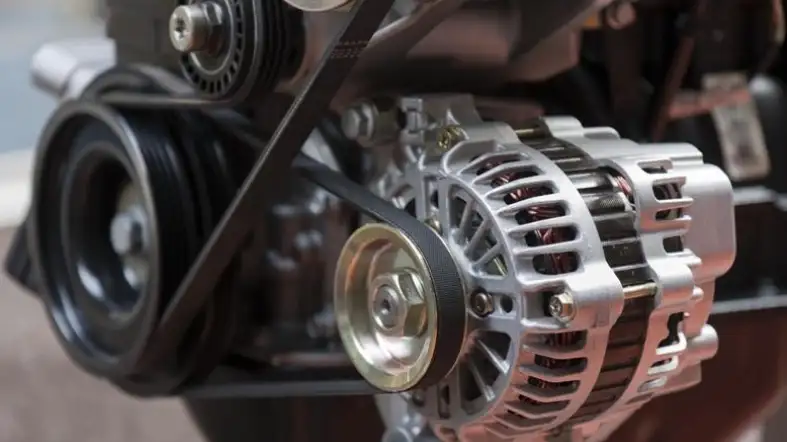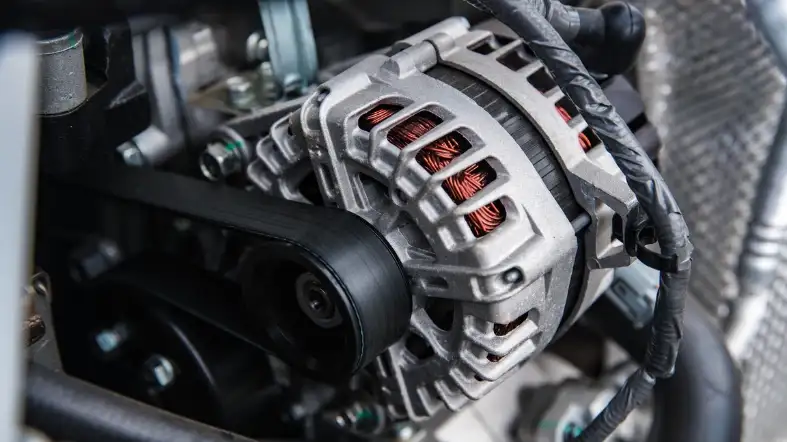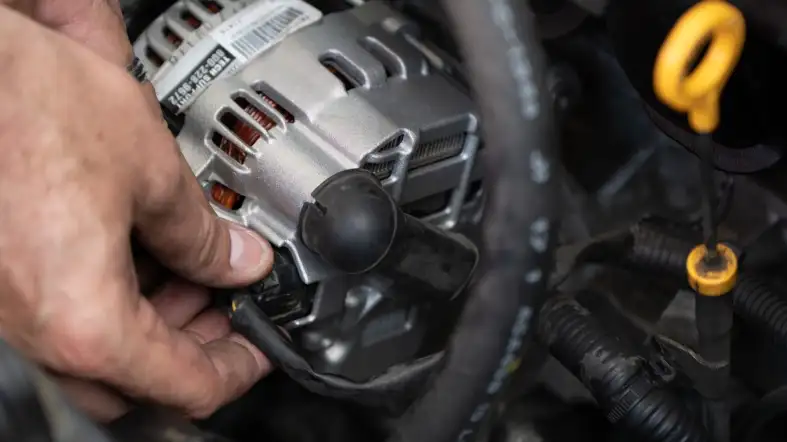Wondering about the signs of a bad starter or alternator? You’re not alone. We’ve compiled the top symptoms and diagnostic tips for you.
Keep your vehicle running smoothly and steer clear of costly repairs by staying informed. Knowledge is power on the road.

What are the signs of a bad starter or alternator?
Here are some common signs to watch out for:
Vehicle Ignition Issues
If your car won’t start or makes clicking sounds when you turn the key, it could be a bad starter or a dead battery.
Sometimes, a dead battery can also make your lights dim or flicker.
Dimming Or Flickering Lights
While you’re driving, if your car’s lights seem to get dimmer or flicker, it could be a sign of a bad alternator or a weak battery.
A failing alternator can’t keep the battery charged properly, causing these issues.
Weird Noises At Start-Up
If you hear odd grinding, whining, or squealing noises when you start your car, it might mean your starter is bad or you have a loose belt.
These noises can happen because of worn-out starter parts or a loose belt.
Fast-Draining Battery
If your battery loses power quickly when your car is parked, it might be because of a bad alternator or something called a parasitic draw.
If your car’s alternator is broken, it won’t charge the battery properly.
And a parasitic draw occurs when something keeps using power even when the car is turned off.
Warning Light On Dashboard
Seeing a battery-shaped warning light on your dashboard could mean trouble with the alternator or the charging system.
The light might stay on or flicker, depending on how serious the problem is.
Engine Stalling
A bad alternator or fuel pump can make your engine stall while you’re driving.
When the alternator can’t give enough power, the engine doesn’t work well, and a messed-up fuel pump can mean not enough fuel gets to the engine for it to run.
Hard To Crank
If your engine turns over slowly or not at all when you try to start the car, it could be because of a bad starter or a low battery.
An old starter can’t spin fast enough, and a low battery doesn’t have the power needed to turn the starter motor.
Weird Stuff With Electronics
If your car’s gadgets, like the radio or dashboard gauges, start acting weird, it could be due to issues with the alternator or loose connections.
These problems need quick attention! Getting it checked ASAP is crucial to ensuring your car runs smoothly.
When the alternator isn’t working right or the connections are loose, it can mess with the electronic systems.
Visible Damage or Belt Issues
Inspecting your starter and alternator is crucial to ensuring the health of your diesel engine.
Look for any visible physical damage, signs of overheating, corrosion, or leaks in the engine area.
These issues can have a domino effect, affecting critical components such as wires, terminals, bearings, and belts.
Damaged or worn belts, in particular, can lead to reduced efficiency and potential breakdowns.
Regular checks can help you catch problems early and prevent more extensive damage.
Battery Terminal Corrosion
Battery terminal corrosion can occur due to acid buildup, moisture, dirt, or exposure to salt.
This corrosion can deteriorate the connection between the battery and the starter or alternator.
It’s important to address this issue promptly because poor battery connections can lead to electrical problems, difficulty starting the engine, and reduced performance.
Regularly cleaning and maintaining the battery terminals can help ensure a reliable electrical connection and prevent potential engine issues down the line.
Inconsistent Voltage Readings
You can use a voltmeter to test your car’s battery and alternator.
A good battery should have around 12.6 volts when the car is off and about 14.2 volts when it’s running.
A working alternator should show roughly 13.5 to 14.5 volts while the engine is running.
If the readings are off or inconsistent, it might mean a starter or alternator problem.
Reduced Power In Accessories
If your car’s accessories (AC, heater, radio, and windows) act up or stop working, it might be due to a weak battery or a faulty alternator.
These issues arise from a lack of electrical power. Think of it like worn-out toy batteries; when they weaken, performance suffers.
The alternator charges the battery, and if it’s not doing its job or the battery is worn out, your car’s features can malfunction.
To maintain smooth operation, check the alternator and battery if you experience issues with these accessories.
Early detection of starter or alternator problems is crucial for a well-functioning car.
What are the causes of a bad starter or alternator?
There are many factors that can cause your starter or alternator to go bad, such as:

Age
Despite being built to endure for a very long period, your starter and alternator will ultimately wear down from regular use.
Starter lifespans typically range from 100,000 to 150,000 miles, whereas alternator lifespans typically range from 100,000 to 150,000 miles.
Nevertheless, this is subject to change based on the caliber, use, and condition of your vehicle.
Corrosion
Your starter and alternator are exposed to elements that might lead to corrosion, such as moisture, dirt, salt, and other chemicals.
Your starter and alternator’s performance and efficiency may be negatively impacted by corrosion to the wires, terminals, connectors, and other parts of the device.
Overuse
When you start and drive your car, the starter and alternator kick into action.
If you frequently start and stop your car, like in traffic or on short trips, you put extra strain on these parts.
This can make them overheat, wear out faster, or even stop working sooner than expected.
It’s like giving your car a workout it wasn’t built for! So, try to keep the constant stopping and starting to a minimum to help your car’s starter and alternator stay in good shape for longer.
Normal Wear and Tear
When parts in your starter and alternator rub against each other, they create heat and friction.
This can cause the components to wear out, stop working correctly, or even break over time.
The brushes in your starter and alternator get worn down after a lot of use with the armature and slip rings.
This can happen because of the constant rubbing, and it’s important to be aware of it to keep your car running smoothly.
High Temperature
The engine in your vehicle, which produces a lot of heat, is nearby, as are the starter and alternator.
Your starter and alternator may overheat if the engine overheats or if the engine compartment is not ventilated enough.
If the cables, coils, magnets, and other parts of your starter and alternator get damaged, it’s likely due to some issues.
Things like diodes, rectifiers, and regulators might be affected too.
Excessive Engine Heat
When your engine burns fuel and air, it creates heat. If it gets too hot, it can overheat.
This can happen if the temperature is too high or if there’s a problem with the cooling system, like a leaky radiator or a broken thermostat.
By causing them to expand and contract under heat stress, this can have an impact on your starter and alternator.
Your alternator and starter parts may crack or deform as a result.
Fluid Leaks
Different fluids in your car clean, cool, or lubricate various car components.
These fluids consist of braking, power steering, transmission, washer, and coolant as well as oil and coolant.
Certain liquids can harm your car’s electrical components, like the starter and alternator.
If they spill, they may cause short circuits, corrosion, or contamination. It’s important to avoid these liquids to keep your car running smoothly.
Electrical Overload
Overloading your car’s electrical system with extra accessories like radios, lights, or chargers can strain its capacity.
It’s similar to overloading an outlet at home, which can lead to problems.
Adding too much to your car’s electrical system can make the alternator work harder, blow fuses, and drain the battery faster.
This can lead to overheating, burnout, or malfunction of the starter and alternator.
So, it’s essential to avoid overloading your car’s electrical system to ensure it functions correctly.
Improper Installation
Make sure to install your starter and alternator properly if you decide to replace or repair them yourself.
Your starter and alternator risk being damaged or out of alignment if you install them incorrectly, whether by utilizing the wrong materials, tools, or installation methods.
Their longevity, effectiveness, and performance may be impacted by this.
How to prevent starter or alternator failure?
Here are some simple steps you can take to prevent starters or alternators from failing:

Maintenance practices
Maintaining your vehicle is vital for preventing starter or alternator issues.
Follow the manufacturer’s recommendations for tune-ups, fluids, filters, spark plugs, and regular oil changes to keep your car in good condition.
Additionally, inspect and replace batteries, belts, wires, fuses, and other electrical components as part of routine care.
These simple practices will help ensure your vehicle runs smoothly and avoids potential breakdowns.
Regular inspections
Regular checkups help prevent starter or alternator issues. Inspect them often for any signs of trouble to avoid potential failures.
Search for any signs of trouble, such as sounds, leaks, burns, frays, loose connections, cracks, leaks, burns, and frays.
Testing the voltage and current output of your battery and alternator should also be done with a voltmeter or multimeter.
Take your car to a professional for further analysis and repair if you see anything odd or suspicious.
Proper lubrication
For the purpose of avoiding starter or alternator failure, proper lubrication is also crucial.
The friction and heat generated by these gadgets’ moving parts are decreased via lubrication.
Use grease and oil of the highest caliber recommended by your car’s manufacturer.
Using too much or too little lubrication can also lead to issues; therefore, you should avoid doing so.
Voltage regulator checks
A voltage regulator is essential for managing electricity in your car.
It ensures the right power levels from the alternator to the battery and other components, preventing overcharging or undercharging that can harm your battery and more.
Regularly check its operation by using a voltmeter or multimeter to measure the voltage at the battery terminals while the engine is running.
Ideally, the voltage should be between 13.5 and 14.5 volts. If it’s too high or too low, a faulty voltage regulator may be the issue and should be replaced.
Battery condition
For your starter and alternator, your battery serves as the power supply. To prevent starter or alternator failure, you should maintain a healthy battery.
Every few months, you should check the charge level of your battery, and if it is below 12.6 volts, recharge it.
Make sure to regularly clean your battery wires and terminals to remove any corrosion, debris, or dust that can block electricity flow.
Change your battery every three to five years or when you notice signs of wear.
Electrical system analysis
Your car’s electrical system is a team, with the battery, starter, alternator, and various components working together.
Regularly check for issues using a code reader or scan tool to detect error codes and inspect wires and connections for damage or looseness with a test light or continuity tester to ensure smooth operation.
Replacement considerations
When replacing your starter or alternator, prioritize quality by choosing units that meet or exceed your car’s original specs.
Avoid low-quality options. Opt for products with generous warranties, understanding the warranty terms and claims process.
Compare prices for the best value and factor in installation and labor charges if not doing it yourself.
FAQs
Can a bad starter or alternator cause other problems with my vehicle?
Yes, it can lead to issues like electrical malfunctions and premature battery failure.
Is age a common factor in starter or alternator failure?
Yes, age is a significant factor as these components wear out over time.
Are weird noises at start-up always a sign of a bad starter or alternator?
No, strange noises can indicate various problems, not just starter or alternator issues.
Do I need to replace my alternator or starter if I see dimming lights?
Not necessarily, as dimming lights can result from multiple factors, requiring a professional diagnosis.
Conclusion
Recognizing signs of a bad starter or alternator is vital for car owners to prevent unexpected breakdowns and costly repairs.
From ignition problems to dimming lights and engine stalling, these signs are important.
Preventing failure requires regular maintenance, inspections, proper lubrication, voltage regulator checks, and battery care.
These measures ensure a reliable and long-lasting electrical system, leading to a smoother and worry-free driving experience.
